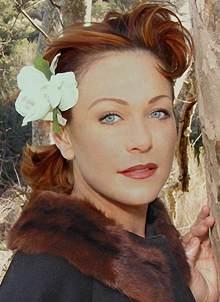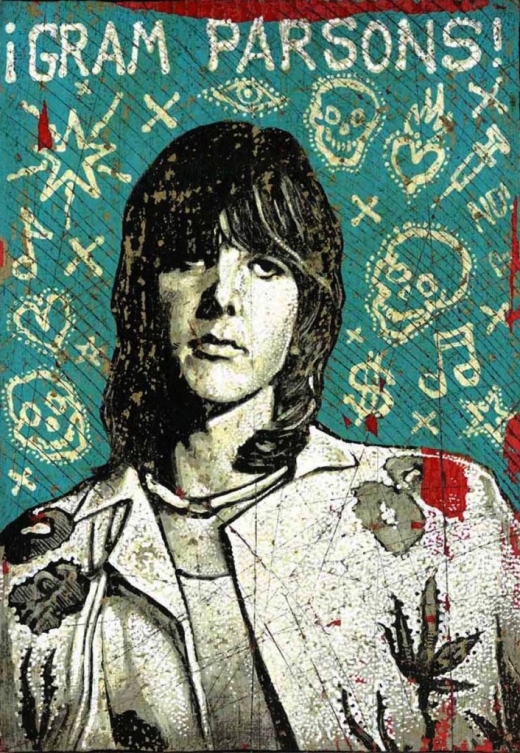[Artwork by JON LANGFORD]
VARIETY: The Gram Parsons Foundation, the non-profit organization devoted to funding and education for substance abuse recovery in the music community, will relaunch with a pair of events set for Wednesday as part of the South by Southwest Music Conference in Austin, Texas. The org takes its name from the influential country-rock pioneer, who died in Joshua Tree, Calif., in 1973 from a morphine overdose. It is headed by Parsons’ daughter Polly [pictured, below right], who has faced her own struggles with drug and alcohol addiction. “Recovery is the only way I survived my bloodline,” she says. “Everyone in my family is dead from suicide and addiction, on both sides.” MORE
AUSTIN CHRONICLE: “I was sitting on the living room floor, and it came on the news,” recalls Parsons. “I immediately went to find out what was going on. I was told a different story every month for about six months – told he died in a fire, he had a heart attack. … After he died, my mother had a real hard time. We went from commune to commune to commune to commune to commune. She never married and mourned the death of my father more than the life of me. She got sober when I was 14, but by that time it was too late. She was alive and alert, but I was in pain and pissed off. “By 16, I became horribly addicted to cocaine and alcohol. I never mentioned who my father was, so no one knew until I was about 25. I was terrified that my outcome would be written in stone if I acknowledged the fact that I came  from people that couldn’t manage to stay on the planet. That’s what my lineage was. “Finally, I got to discover him by myself, on my own terms, and it wasn’t pretty. I locked myself in a room, and I listened to everything, and I wrote down everything in journals. I prayed and cried and ripped things up, and 12 days later I came out of that room like: ‘Okay. I’m ready.’ “I was about 32.” MORE
from people that couldn’t manage to stay on the planet. That’s what my lineage was. “Finally, I got to discover him by myself, on my own terms, and it wasn’t pretty. I locked myself in a room, and I listened to everything, and I wrote down everything in journals. I prayed and cried and ripped things up, and 12 days later I came out of that room like: ‘Okay. I’m ready.’ “I was about 32.” MORE
ROCK SNOB ENCYCLOPEDIA: GRAM PARSONS — aka the Grievous Angel; widely accredited as the inventor of country-rock; responsible for stoner detours by both the Byrds and the Rolling Stones into the pastoral glories of C&W; patron saint of the alt-country movement. Born Cecil Ingram (“Gram”) Connor III into wealth and privilege on Nov. 5, 1946, his grandfather John Snivley owned about one-third of the citrus fields in Florida, and his trustafarian status would underwrite a low-paying but highly influential music career. His father committed suicide when Gram was 12, and his mother remarried a year later to Robert Parsons, who legally adopted young Gram. Seven years later, his mother would drink herself to death, passing away the very day Parsons graduated high school. MORE
RELATED: Gram Parsons had been hanging out at the Joshua Tree National Monument for several years — he went there regularly, with Chris Hillman when they were bandmates, and later with Keith Richards, to get high, commune with the cactus, and watch the sky for UFOs. He reserved two rooms at the nearby Joshua Tree Inn, a modest cinder-block motel whose owners had come to know Parsons after several visits. Along with Parsons on this trip were his “valet” and chum, Michael Martin; Martin’s girlfriend Dale McElroy (no fan of Gram Parsons); and an old friend from his high school days in Florida named Margaret Fisher. The events of that trip have been recounted by Dale McElroy, who told her story to Ben Fong-Torres when he was writing Hickory Wind, then retold it in her own words in Phil Kaufman’s 1993 bio. Other accounts differ, but hers seems the most reliable. The foursome arrived Monday, September 17, 1973. That day they indulged sufficiently that Martin returned to Los Angeles the next morning to score more marijuana — even though Martin theoretically went along on the trip so he could look after Parsons. Parsons dragged the women out to the airport for lunch, throughout which he drank Jack Daniels non-stop. MORE

